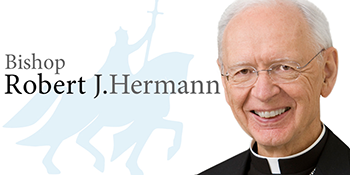
We are better than we think we are, and we are better off than we think we are. Our faith tells us this in the readings for the Sixth Sunday of Easter.
In the first reading Peter is in the house of Cornelius, a Gentile. According to Jewish teachings, it was wrong for a Jew to enter a Gentile’s home, for this would render such a person unclean. This was Peter’s concern, but God commanded him to go to Cornelius’ home and witness to Jesus.
When Peter arrived, “Cornelius met him, and falling at his feet, paid him homage. Peter, however raised him up saying, ‘Get up. I myself am also a human being.’” What Peter really says is: “Don’t look at us. Look at the invisible One who sent us to invite you to be His disciple.”
“Then Peter proceeded to speak and said, ‘In truth, I see that God shows no partiality. Rather in every nation whoever fears Him and acts uprightly is acceptable to Him.’”
As Peter was speaking, the Holy Spirit interrupted by coming upon these Gentiles in the same way He had come upon the apostles at Pentecost. Peter’s eyes were then opened to see what God was doing in the Gentiles. He “was astounded that the gift of the Holy Spirit should have been poured out upon the Gentiles also. …”
Peter then said, “Can anyone withhold the water for baptizing these people, who have received the Holy Spirit as we have?”
Imagine the joy Cornelius and his family experienced when they came to realize that they too were welcomed into God’s household.
Who we are doesn’t depend upon place of birth, race, nationality or position in society. Who we are is determined by the Father who created us in His own image and likeness and then redeemed us through the death and resurrection of His Son, Jesus.
We are beloved sons and daughters of the Father, and through baptism we were made His adopted children. Therefore, we need to look to the Blessed Trinity to realize our dignity as beloved sons and daughters of a beloved Father. We aren’t chance happenings. A loving Father, who has a caring plan unfolding before our very eyes, chose us into being.
In the second reading, John writes: “In this is love: not that we have loved God, but that He loved us and sent His Son as expiation for our sins.” We aren’t an accident that happened, but we are the ones chosen by the Father. To Him we look for our received identity. We can’t make ourselves into something worthwhile — our Father and Jesus have already done that. We need to look to the Father to receive the identity He has already given us through Jesus.
We are not the sinful actions that we have performed, but beloved children for whom Christ died to take away all sins. Through baptism and reconciliation we are clothed in God’s love, the Holy Spirit. We have Godly power flowing through us, enabling us to overcome sin and to live in union with our God. We live in joy in the forgiveness of our sins. Sin doesn’t give us our identity; Jesus does through the remission of all of our sins.
Because of His forgiveness, we don’t allow our sins to condemn us but, rather, Jesus’ forgiveness of our sins identifies us as beloved children of the Father, destined to share eternal glory with the Most Holy Trinity for all eternity.
All of this comes into a clear focus in the Gospel. Listen to the words of Jesus: “Jesus said to His disciples: ‘As the Father loves me, so I also love you. Remain in my love.’” In other words Jesus says: “The Father and I have loved each other from all eternity, and I love you as much as the Father loves me and the Father loves you as much as He loves me!”
This truly astonishing statement leads us to exclaim to Jesus, “If the Father loves us as much as He loves you, we certainly like His attitude toward us better than our own. If that is the identity your mercy gives us, then we want to live that identity as forgiven sinners. We want to live in your forgiveness, not in our own self-condemnation. You really change our attitude toward ourselves. Help us to live this identity and to share this hope with others by the way we live our lives.”
Jesus continues: “I no longer call you slaves, because a slave does not know what his master is doing. I have called you friends because I have told you everything I have heard from my Father.”
The full revelation of what Jesus heard from the Father was revealed to us on Calvary when Jesus cried out, “Father, forgive them for they know not what they do!” That is when the Father revealed the love in His heart.
Jesus says, “It was not you who chose me, but I who chose you and appointed you to go and bear fruit that will remain, so that whatsoever you ask the Father in my name He may give you.”
The fruit you and I are called to bear is to live our identity as forgiven sinners, giving others hope that God desperately desires to save them also through His mercy. People you do not know are watching you and your behavior. Every prayer you utter, every good deed you perform turns on the light of Christ more brightly in you. This is your true identity — live your life as a forgiven sinner for others to see.